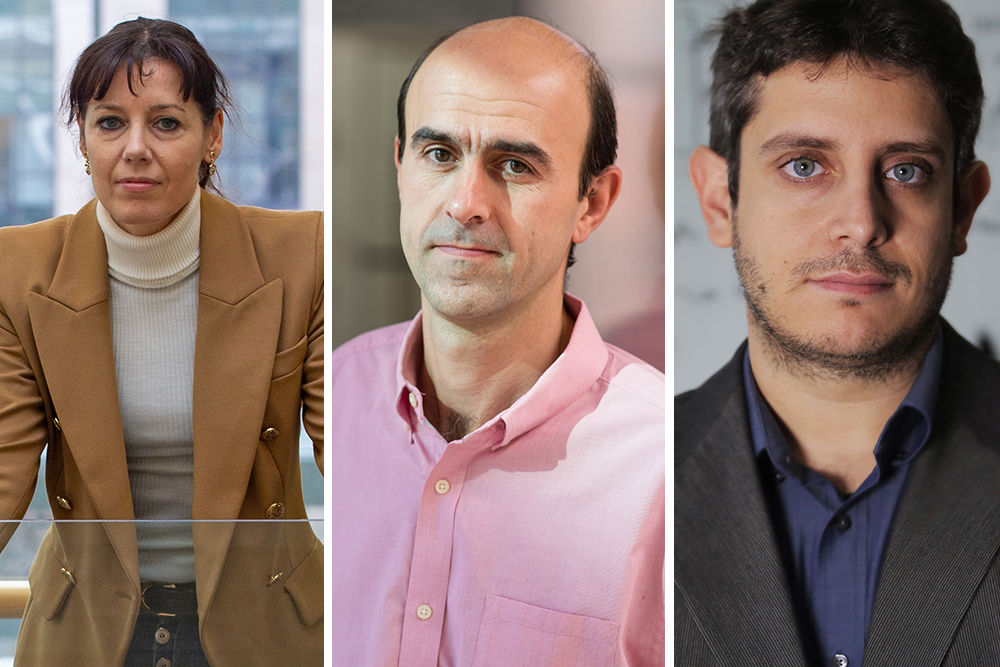Three MIT professors named 2024 Vannevar Bush Fellows
Domitilla Del Vecchio and Themis Sapsis of MechE and Mehrdad Jazayeri of BCS and the McGovern Institute will each receive up to $3 million for blue-sky research.

The U.S. Department of Defense (DoD) has announced three MIT professors among the members of the 2024 class of the Vannevar Bush Faculty Fellowship (VBFF). The fellowship is the DoD’s flagship single-investigator award for research, inviting the nation’s most talented researchers to pursue ambitious ideas that defy conventional boundaries.
Domitilla Del Vecchio, professor of mechanical engineering and the Grover M. Hermann Professor in Health Sciences & Technology; Mehrdad Jazayeri, professor of brain and cognitive sciences and an investigator at the McGovern Institute for Brain Research; and Themistoklis Sapsis, the William I. Koch Professor of Mechanical Engineering and director of the Center for Ocean Engineering are among the 11 university scientists and engineers chosen for this year’s fellowship class. They join an elite group of approximately 50 fellows from previous class years.
“The Vannevar Bush Faculty Fellowship is more than a prestigious program,” said Bindu Nair, director of the Basic Research Office in the Office of the Under Secretary of Defense for Research and Engineering, in a press release. “It’s a beacon for tenured faculty embarking on groundbreaking ‘blue sky’ research.”
Research topics
Each fellow receives up to $3 million over a five-year term to pursue cutting-edge projects. Research topics in this year’s class span a range of disciplines, including materials science, cognitive neuroscience, quantum information sciences, and applied mathematics. While pursuing individual research endeavors, Fellows also leverage the unique opportunity to collaborate directly with DoD laboratories, fostering a valuable exchange of knowledge and expertise.
Del Vecchio, whose research interests include control and dynamical systems theory and systems and synthetic biology, will investigate the molecular underpinnings of analog epigenetic cell memory, then use what they learn to “establish unprecedented engineering capabilities for creating self-organizing and reconfigurable multicellular systems with graded cell fates.”
“With this fellowship, we will be able to explore the limits to which we can leverage analog memory to create multicellular systems that autonomously organize in permanent, but reprogrammable, gradients of cell fates and can be used for creating next-generation tissues and organoids with dramatically increased sophistication,” she says, honored to have been selected.
Jazayeri wants to understand how the brain gives rise to cognitive and emotional intelligence. The engineering systems being built today lack the hallmarks of human intelligence, explains Jazayeri. They neither learn quickly nor generalize their knowledge flexibly. They don’t feel emotions or have emotional intelligence.
Jazayeri plans to use the VBFF award to integrate ideas from cognitive science, neuroscience, and machine learning with experimental data in humans, animals, and computer models to develop a computational understanding of cognitive and emotional intelligence.
“I’m honored and humbled to be selected and excited to tackle some of the most challenging questions at the intersection of neuroscience and AI,” he says.
“I am humbled to be included in such a select group,” echoes Sapsis, who will use the grant to research new algorithms and theory designed for the efficient computation of extreme event probabilities and precursors, and for the design of mitigation strategies in complex dynamical systems.
Examples of Sapsis’s work include risk quantification for extreme events in human-made systems; climate events, such as heat waves, and their effect on interconnected systems like food supply chains; and also “mission-critical algorithmic problems such as search and path planning operations for extreme anomalies,” he explains.
VBFF impact
Named for Vannevar Bush PhD 1916, an influential inventor, engineer, former professor, and dean of the School of Engineering at MIT, the highly competitive fellowship, formerly known as the National Security Science and Engineering Faculty Fellowship, aims to advance transformative, university-based fundamental research. Bush served as the director of the U.S. Office of Scientific Research and Development, and organized and led American science and technology during World War II.
“The outcomes of VBFF-funded research have transformed entire disciplines, birthed novel fields, and challenged established theories and perspectives,” said Nair. “By contributing their insights to DoD leadership and engaging with the broader national security community, they enrich collective understanding and help the United States leap ahead in global technology competition.”



